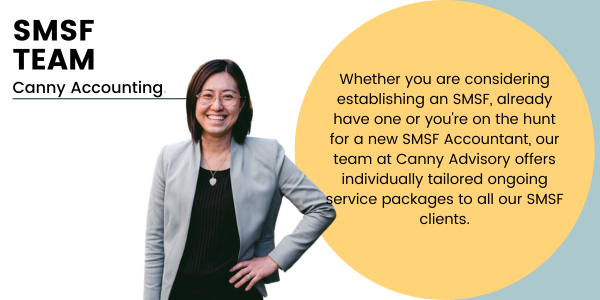When Is It Time To Consider A Self-Managed Super Fund?
Written by: Accounting Team
When superannuation comes up in conversation, are you interested in the topic, or do you tune out? The superannuation industry attracts a lot of jargon and to some, it seems out of reach.
The superannuation industry is a trillion-dollar industry, that’s right TRILLION-DOLLAR. The majority of these superannuation assets are held in ‘retail’, ‘corporate’ and ‘public sector’ superannuation funds or ‘normal super funds’ as some might say. You know the ones! Those funds that were automatically opened for you when you started your first job or opened when your employer was required to start paying your superannuation as part of your employment. Superannuation can also be held in a ‘self-managed super fund’ or an ‘SMSF’.
What is an ‘SMSF’ aside from the acronym I say so often, I can no longer say SMS without the ‘F’! More on that in a moment…
Superannuation is one, if not the most, important investment vehicle of your life. The Government certainly thinks so! Mandatory payments of superannuation and minimum benchmarks for superannuation fund performance highlight how important your superannuation is to fund your retirement.
At all stages of life, however, many people ‘set and forget’ their superannuation accounts. To some, the world of superannuation is confusing, complex and overwhelming – and we agree! The superannuation industry continues to grow and change each year. Little wonder people are left confused about their options available for managing and investing their superannuation benefits.
Let’s Go Back To Basics For Financial Goals
All superannuation benefits are held in a trust. This applies to both ‘normal’ super funds and self-managed super funds. At the core, this means a responsible entity (the trustees) are tasked with investing and managing superannuation benefits held in the trust, on behalf of their members (also known as the beneficiaries), to provide them with retirement or death benefits.
The difference between ‘normal‘ and self-managed super funds comes down to public versus private. Self-managed super funds are a private form of a superannuation trust where the trustees (the ones making the investment decisions) are the same as the members (the ones impacted by the performance of the trust), in very rare cases and under specific legislation are these ever different. By comparison, ‘normal‘ superannuation trusts are where the trustee or responsible entities are separate from the members, where the trustees manage thousands upon thousands (or many more) members in any given year.
‘Normal’ Super Funds -vs- Self-Managed Super Funds
My Head Hurts, Are The Different Super Funds Really Any Different Then?
Yes! On the surface, it does seem like they are the same though:
Trustee + management decisions + member = retirement + death benefits for those members.
Simple!
Well, yes, but not quite. Another core difference between ‘normal’ super funds and self-managed super funds is control, choice and flexibility. But I hear you say, my ‘normal’ super fund allows me to choose my investment options already, how does a self-managed super fund differ?
‘Normal’ super funds have different investment options that can be chosen by the member, and then their benefits are invested according to that strategy or investment mix. Members can choose to keep a close eye on the performance of the fund and make any adjustments along the way, or they can let it run in the background without further thought. Keep in mind, the superannuation industry is heavily regulated and just because you prefer to ‘set and forget’ doesn’t mean you are doing yourself a disservice, although talking to a Financial Adviser would not go amiss, to make sure your super is working hard for you!
A self-managed super fund requires you to be an active participant in all the decision-making, operating, and investing of your superannuation benefits. There are two sides to this participation. On the one side, you have greater control over the day-to-day operations of the fund:
- You can manage the funds’ bank account directly;
- You can pick and choose the nitty gritty investments you want;
- You can invest in some asset types unavailable to ‘normal’ super funds such as real physical property and unlisted companies/trusts (if you follow the rules!);
- If you aren’t an investment whizz, you can still choose to engage a Financial Adviser who will provide support and guidance to achieve your goals and objectives;
- You can execute strategies to support estate planning and asset protection goals; and
- The SMSF Association found SMSFs with $200,000 or more can be competitive with industry and retail funds in terms of cost and performance.
Interested in finding out more about real physical property that you can purchase in a self-managed super fund? Check out this article we’ve previously put together: Property + Your Self-Managed Super Fund.
Advantages of Self-Managed Super Funds
With Control, Choice + Flexibility Comes Great Responsibility!
On the other side, some financial savviness is recommended. After all, as trustees of your own super fund, you need to ensure the fund remains compliant with the current rules and legalisation (and there is a lot of that). Did you know that an SMSF must be audited by an independent Auditor annually? This also must happen before the SMSF can lodge their annual tax return! The administrative upkeep of an SMSF is not always everyone’s cup of tea. Love it or loathe it, compliance is key Accounting specialists in SMSF compliance and administration are worth their weight in gold.
Even engaging professional services such as Financial Advisers and Accountants does not absolve you of the ultimate responsibility of the fund, which will always come down to the trustee (you). Making the most appropriate decisions in an SMSF can be challenging and while an SMSF can have one to six members, that does not mean it may be the right fit to combine the superannuation of your best mates, siblings, and parents together! A self-managed super fund can be well suited to the right person, couple or family.
These comparisons are not exhaustive, nor is this the be-all and end-all.
So, When Is There A Right Time To Consider A Self-Managed Super Fund?
Not to draw on a cliche – how long is a piece of string? There is no one right answer. The right time could occur at any stage of your life. If you are looking to take a more active role in your superannuation benefits by having control, choice and flexibility, it is time to seek some financial advice.
Setting up a self-managed super fund is not to be done on a whim, and carefully planning and consideration of your goals and objectives are important. Equally important is partnering with a Financial Adviser and Accountant you trust to support you on your journey. Are you sitting on the fence?
Get in touch with our team to find out more!





